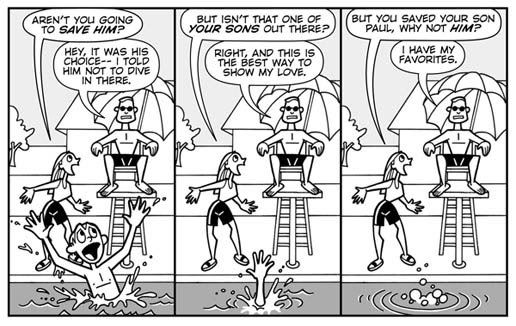
For those of you tired of hearing me rant about topics from a Universalistic point of view, I will apologize in advance. Because I am about to embark on yet another, though, I feel like this is a crucial issue to talk about(as usual but still). And its also nice to have some in depth arguments typed out as I learn these things myself, and try to show others where Im coming from:
An argument I have heard frequently in opposition to the Christian Universalist, is like the one below that I pasted from an actual Christian forum post:
" it's not YOUR heaven, God is not subject to YOUR interpretations or YOUR rules or YOUR fallacious opinions...God is not obligated to let [anyone] into HIS kingdom. If that idea makes you 'boo-hoo,' with all respect, get over it."
While this poster presented the argument in an extremely brief, bogus and heartless way, I will admit that he and others have a point. Because I agree, God is not subject to merely what we think is right and "just" as humans. We are not entitled to anything on our own(why do you think Christ died to begin with?). What God has made He most certainly has the right to do with however He so chooses under whatever conditions he deems. For as I've said before, our finite minds can only grasp so much at that which is God and His ways.
But the argument is still...only half-baked, to say the least. And heres why...
This argument assumes that Gods idea of "justice" must be completely at odds with the typical ideals of human justice, in order for God to be...well...God.
But here's the thing though...if what WE think is Gods "fair and perfect justice" is that people will be tormented infinitely for not understanding the correct views of God by an un-given due date...than what does that say about our own ideals of "justice"? Can we truly call our ideals of right and wrong, fair and unfair, true "justice"...if that perception be true?
Suppose I'm principal of a new elementary school, and I try to establish the ground rules through some brief conversation to the kids in classroom A (lets assume there's 27 classrooms total). The kiddies in classroom A eventually proceed to construct a "rule book" based as closely as they can off what I told them a few weeks earlier and tries to be "good" lil students and follow it. Now the other 26 classrooms have no idea about what I told classroom A, and they are all running around, terrorizing the teachers, having food fights and erecting statues of Bart Simpson. Classroom A then goes out and tries to teach the other classrooms about my rules from their "rule book".
"HEY GUYS WE GOT THE RULEBOOK ON HOW THE PRINCIPAL WANTS US TO ACT!!!"
Lets say classrooms B, C, and D accepts the message of the "rule book" as truth because lets say I write them a note and say,
"Yes these are pretty much the school rules"
and thus classrooms A through D tries to follow it and tell other classrooms...but are unable to convince the others that the "rule book' is actually based on what I, the princapal of the school, said. And since the "rule book" following classrooms cannot prove as fact that the rulebook does in fact, contain my rules, the other classrooms refuse to follow. Then one day after a month of this I decide to come down from my office and forever expel from school all the little bad, food fighting terrorist kiddies because they didn't follow the rulebook that classroom A wrote about my rules.
Now, regardless of the fact no school is run like that (though here in America I wouldn't be too surprised), could we honestly say that, I, the Principal, executed "justice" and "fairness" at its finest by forever expelling kids for not following rules that were never proven to all to be mine? Would their parents no less expect that I have mercy and common sense, and make my decisions according to the situations and not merely just the actions? I think its safe to say that, though they need to be punished, a "everlasting" and "unchangeable" expulsion would not only be unfair to the children, but completely ludicrous.
Why then do we assume that God, the pinnacle of all that is "just" and "fair", will execute "justice" towards humanity, in an even more gruesome and unfair way than the principal did to the school children? It cant be only the "Christian Universalist" that sees the injustice presented by mainstream theology. And I feel the only reason that many people (including myself for many years) stomach this contradicting idea is because they've been taught that that is the ONLY conclusion one can draw from the Bible. Therefore the typical Christian allows this moral piracy to invade their beliefs because they feel to question this particular interpretation of the Bible, is to question the Bible and/or the motives of God himself...but I would argue that it is not. I would argue we owe it to God to test and refine our understanding of Him and His ways the best we can in this life. And I feel it is unfair to hardheadedly presume that God's perception of justice is somehow less merciful and fair than our own gut feelings, and then scapegoat it as just some weird "mystery of God!"that for some reason...cant be examined or investigated without God frowning down at us. God should not be below or matching our ideal judge, but be far greater.
So then what would we as humans generally conceive as (at least ideally) a"just" or "fair" judge? Consider the following:
-A just human judge would first of all, have to be unbiased and impartial.
The Bible says that God does not show partiality (Col. 3:25).
-A just human judge would not let crime "off the hook" without punishment, but would propose a fair punishment to fit the crime. The Bible tells us that God renders to EACH according to his deeds (Ro. 2:5-6), therefore a generic "infinite" punishment would make no sense because the measure by which God would punish us would be the same for everyone regardless, and not tailored to the "crimes" themselves.
-A just human judge would do what he could to seek the correction of the culprit, to show them right from wrong and what wrong gets you. Not just to "avenge" those that were wronged to begin with. The Bible tells us that people will learn "righteousness" from Gods judgments(Is. 26:9), but how would they learn or benefit from the learning of what is right, if all they're doing is being BBQ'd for all eternity in Hell? How does that add up to God's purposes for judgment?
-A just human judge would consider all the variables involved in what caused the criminal to act as they did(if they indeed did), including their mental health and age. Most Christians do not believe that the mentally handicapped or small children undergo infinite punishment in Hell, because the state of their mind keeps them from being capable of fully comprehending right from wrong and what Jesus did for them...but doesn't every person have something(s) that keep them from understanding those things with absolute clarity? Hasn't God allowed us all to be afflicted with sin, the very thing that pulls us from His truth? Did God merely allow man to fall into sin, with no intention to take such a "disease" and "mental insanity" into account on the day of judgment? The Bible tells us that God has more compassion and mercy than that, for what He allowed knowingly(La 3:31-33). I don't believe God will merely turn a "blind-eye" to that which caused us(the "sane")to make our flaws in belief and action, because we too posses a type of "insanity" of the soul, and a blindness of the heart and mind that only Jesus Christ can clean away from us at His appointed times.
Looking at these verses, can we AT LEAST agree that God could be no less a judge than any good human judge or authority? So back on point...would His justice then really be at such complete odds with our own, as mainstream Christianity subtly suggests? You may say
"Well Gods ways are not our own!"
And that is true, but looking at the above statements and verses, I think its safe to say His idea of justice is NOT so far removed from ours, as is taught in the mainstream. It appears instead to me that while the "justice" of God should not be directly proportional to man's, it is a perfect and unfailing projection of that which we idealize as true "justice". God is transcendent and greater,wiser and more loving and forgiving than us in every respect. But at the same time, He made us in His "likeness and image"(Gen. 1:26), so we can expect that the things He essentially instilled in us as "justice", "love" and "mercy" are spitting images of Gods own concepts of them...not completely different(and conflicting) ideas all together. He is the very source of these concepts...so we can only belittle them, not amplify them beyond God's own versions.
So lets go back to the school/principal analogy, and lets say I, the Principal, come to a different verdict. Lets say I don't FOREVER expel the bad kiddies for not understanding the unproven rules, but instead allow them their due punishments, while taking into account what they did not understand and why. And once their punishment runs its course and they understand with absolute clarity what they did wrong and why its bad, allow them to come back to school. Could we agree that this is overall pretty just? Could we agree that the whole reason that I implemented the rules to begin with was to show them what is the good and proper way to act? And wouldn't the punishments not be so much about "getting back at them" or "avenging the teachers that had to put up with them" as much as it was hoping for their overall betterment, in hopes that they one day become very successful and productive members of society? (Okay so maybe I'm romanticizing the principals intentions a wee bit too much, but I think you get the point).
The idea above is called "rehabilitative" justice. It is punishment that seeks the overall improvement of the individual, to aid in turning a "doer of evil" into a "doer of good". And based on what we can generally conceive as justice, and the above scenario...would we expect God to act any less "just" and "purpose-driven" with His own creations? Could His ultimate judgments be not so much the supposed "retained wrath of God now unleashed!" and more so Gods "cleaning up" method of the messes Satan has caused humans to make, and getting the rest of His kids back on track? Wouldn't that be what not only a good, just judge would do, but a loving father...as God is both of those things in their perfection? I propose Gods judgments are not at such great odds with ours, but is rather more analogous and to the very ideas own "perfection" beyond which we can even comprehend. And rather than subjecting us to eternal, un-purposed, punishment...will instead direct correction upon us until the point at which justice is satisfied and we ALL feel the need to turn our whole hearts to Him. For He is not angry forever...but instead wants to gladly give us all mercy(Mic. 7:18)! And I believe He will in due time.
I will let you draw your own conclusion here, but hopefully even if you disagree or find fault with my argument, you can at least better understand what it is your disagreeing with...which is really my ultimate intent with any of these "religious themed" blogs. You cant really understand what you don't agree with if you don't understand whats truly being argued in the first place.
Shalom





